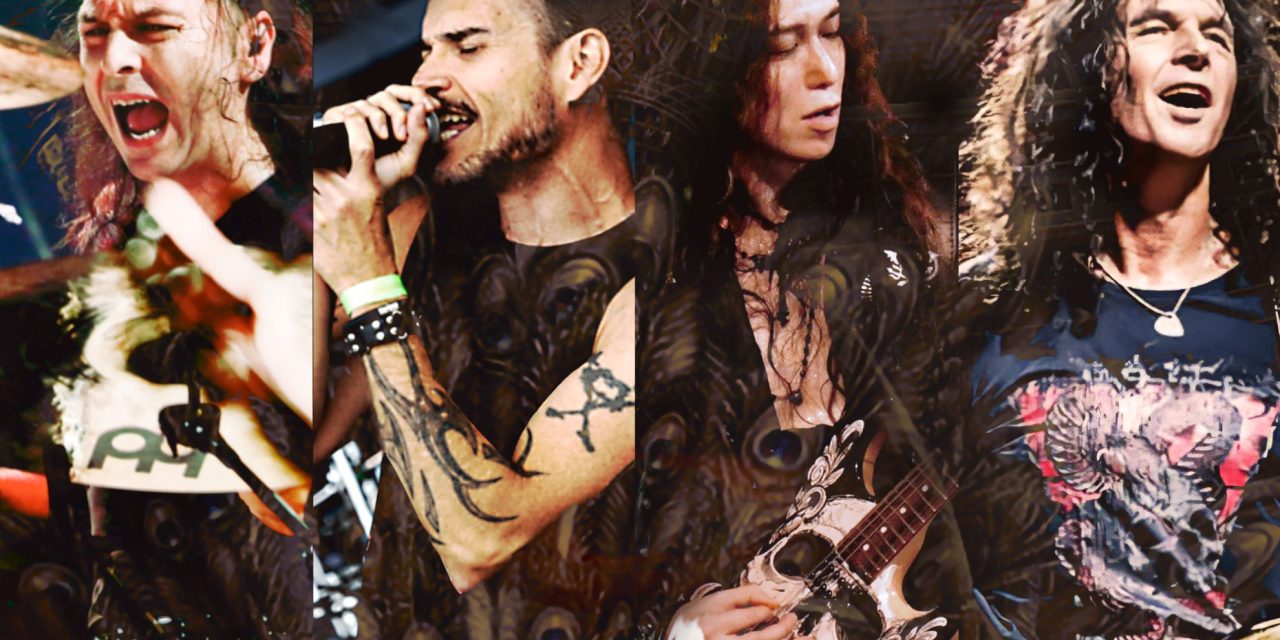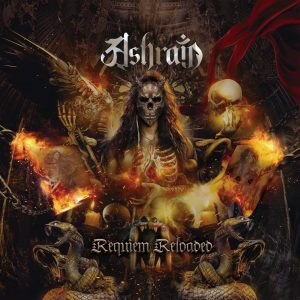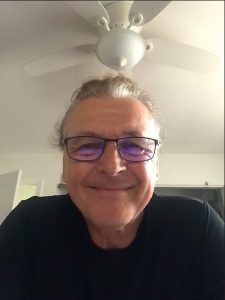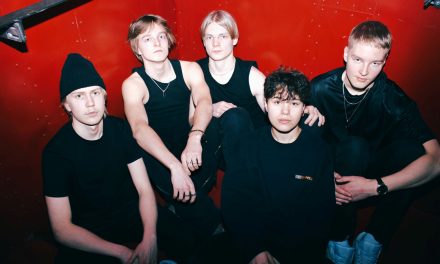
Introducing Ashrain featuring Peter Baltes formerly of Accept


Ashrain!
Introducing Ashrain featuring Peter Baltes formerly of Accept
Ashrain is a dynamic new power metal band, founded by guitarist and producer Nozomu Wakai (Destinia / Shortino / Sigh). In 2020, Nozomu began recording new material with his long-time friend Peter Baltes (ex-Accept). They were later joined by Iuri Sanson (ex-Hibria) and Andy C (ex-Lords of Black). Ashrain was born, and the mighty debut Requiem Reloaded has just been released via Metalville!
Highwire Daze recently had the opportunity to interview legendary bassist Peter Baltes to discuss his participation within the ranks of Ashrain, reasons why he left Accept after 42 years, a reunion with former Accept vocalist Udo Dirkschneider, and more! Read on…
How did you wind up becoming involved with Ashrain?
I met Nozomu Wakai, I think in 2018 when we did a couple of shows in Japan with Accept. And in Tokyo, he came backstage, and we got to know each other and it went from there. He called me like a year later. He said, could you play some bass tracks? And I did that, and he asked me again to play some tracks. He produced an album for Paul Shortino and I did that. And then he asked me if we, the record company suggested, that it was so great together, his style and my style, if we could do something together. I said, yes, why not? So that kind of was the birth of Ashrain in a nutshell.
And so after 42 years of being in Accept, what is it like to be involved in another band in a fresh new band?
It’s actually pretty interesting because, first of all, I haven’t met the other members because everything we’ve done so far because of COVID, and it was postponed for two years was literally, sending files back and forth. So, after I sent my bass tracks. Iuri Sanson – I never heard of him, but what an amazing singer. And then Andy C the Spanish drummer! So anyway, it was pretty amazing to be able to kind of be in a band and create something with, having never met any of the other members. It was a strange thing but interesting in a way.
In this day and age you can do that. Imagine trying to do that with Accept 40 years ago.
It’s an interesting dynamic because, in the old days you would say, “Oh, everybody in the room and let’s go! Yeah. Nice. that only lasts five takes!” And then you start to resent the guy that makes the mistake all the time because the whole band has to play the whole track again and again and again. You lose the whole vibe of it. Where here, you can really dive in. And even though I don’t know the guys that played, but I can tell by their performance what they give me, what kind of musician they are, where they’re coming from, maybe what their background is. You can sense it a little bit and you tune into that, which is kind of interesting. So, there’s pros and cons to both.

Requiem Reloaded by Ashrain
Does Ashrain plan to play live?
I would love to, they’re incredible musicians. Nozomu is such an amazing guitar player and producer, so I think it would be something interesting for people to look at and listen to live – and why not?
The new album is called Requiem Reloaded as far as you know, is there any story behind that title or what does that title mean to you?
I couldn’t tell you. I’m so sorry. I really can’t, because it was Nozomu’s title. We just came up with the name. But, I think it was something he had that was in the works for a long time. I think some of the songs were recorded earlier, like 10 years ago or something but I’m not sure. But I think it is Reloaded. Some of the stuff was a little bit older, so he reloaded it, with new fire.
For fans of Accept, how would you describe the music of Ashrain?
It reminds me very much of 80’s rock. Maybe if you put a little Dream Theater, a little Motley Crue, a little Dokken, put that all in a blender. I think that’s kind of what will come out. It’s 80’s rock, but it’s a little progressive. It’s not like little three-minute songs. There are epic intros, there’s parts where you don’t anticipate, wow, they’re going there, or they’re changing the rhythm here. It’s kind of cool.
You were in Accept for 42 years. What made you decide that it was finally time to time to step back, and did you ever think you’d be in another band again?
Good question. Well, you know, Accept had like two incarnations – the original one, and then in 2009, we started again, but with a different singer. And that went for like nine years almost. And it was just towards the end, I found out a lot of things that weren’t cool and they were business related, and then music related, input related. So, you realize after all these years, you grew up together, you’ve been in the band forever. I don’t want to sound bitter, but I didn’t have any input musically. It was always the same record after the while. And, you know, I’m a very progressive guy and there was no way to convince Wolf, in any way, that our fans would like that.
So, we basically kept beating a dead horse and just writing the same songs. And I wasn’t into that anymore. And, I was really unhappy. As a musician, the number one thing is that you really like what you do, what you create, and then if it just becomes a job – yeah, you can do that, a lot of people do that. I wasn’t into that. I was never in it for the fame or the fortune, always for the art of creating something and then having people really love it and playing it live. That was my thrill in all of this. So, when that was gone, I just decided to call the quits. And this Ashrain was such a fresh start for me – something totally different. And I’ve been in this world, I’ve played with Don Dokken, I did an album in the 80’s, which was very successful. I played on the first Dokken record in beginning of the 80’s. So I lived in that world that’s different than Accept where it was just German metal and, yeah, it was in 80’s California rock kind of. So, it was very familiar to me, and I enjoy it.

Peter Baltes of Ashrain during our Zoom interview
What was the experience like playing with Dirkschneider and the Old gang?
That was pretty cool. I mean, I hadn’t seen Udo in such a long time, I think since 2005. And, we were always really good friends. I had no quarrels with him at all. That was really the Accept management. For some reason, they didn’t get along at all. They couldn’t stand Udo. So I don’t know. But, I met him in Germany when I visited Stefan Kaufmann, and we spent a whole night drinking and going over old times and it was really nice. And at the time he was doing an album I think with an orchestra, and he asked Stefan and I if we could contribute some songs. So we contributed actually eight songs to that album. And then, there was Covid and he suggested maybe we can do something for the road crew, the truck drivers, everybody was involved in his, organization that doesn’t get any royalties. They had no sort of income for two years. So talked to the record company and we decided to write these three songs, have it come out as an EP and all the proceeds go to the Crew and everybody involved. And it tremendously helped them out. It was very nice. I really thought it was a great idea for Udo. It was really great experience to work with Stefan again and with Udo
And then Udo caught me up in September out of the blue and said, “Listen we just started our European tour and our bass player collapsed on stage and he won’t be back. He’s in a hospital, so would you be able to learn 16 songs?” That at seven o’clock on Tuesday. And he said, “Could you be here on Friday in Berlin and join us on stage?” And I was like, “Okay, alright, I’ll try.” And I did and stayed for even more!
We’re going to go back 40 years, Balls to The Wall actually came out 40 years ago! What goes through your mind knowing that album came out 40 years ago and what do you think of that album now in retrospect?
That is really a long time ago. I think the first thing that comes to mind, because when I look at my royalty statements, the number one song that sells or streams or whatnot is always Balls to the Wall. And, it indicates to me how it’s still being relevant after so many years. That’s one of these cornerstone songs in metal that will always be there. That’s quite an accomplishment, and I’m proud of that. It’s always the best song to play live, it’s just one of these things. So, this album in a way defined us, made us “famous”, let’s put it that way. It was the first song that broke in America, was on radio, and so forth. So, that opened a lot of doors. And that’s what comes to mind when I think about Balls to the Wall.
Now we’re going to go back 30 years ago, another anniversary with Objection Overruled! What do you think of that in retrospect?
It wasn’t a bad album, but it was different. It was a different timeframe and there were already difficulties in the band. I remember recording it. It wasn’t as cheerful as the other ones were. You go back and you think the songwriting process – when you get older everything is different when you do it. You try to be more analytical in things, where when you’re younger you just go for it, you know? So, everybody’s trying to get his input in. Before nobody cared, somebody had a riff. We all played along. So, these dynamics come into play. And then you have record companies, you have all kinds of people involved, where in the beginning you have nobody. So you can write an album like Restless and Wild and Breaker and nobody really interferes.
Later there are a lot of influences and they’re not always positive or they’re not always helpful. And that was one of these albums. Another one is Death Row, where you already get a sense that the band is changing and that there’s a different path. And, I think Objection Overruled was one of these albums where you could kind of sense the path is changing a little bit, even though we tried really hard to stay true to what we did before. But you know, there’s certain times where you can’t hit it anymore. It’s not the same.
Back to Ashrain. Andy C is quite a drummer, he is or was in Lords of Black. You’ve never met Andy C, but what do you think of his work overall and have you heard Lords Of Black?
Of course, I did a lot of research because I was like “Is this programmed or is he actually playing this?” And, he’s actually playing this. He’s a modern style drummer. Not that old school which is different, but for this type of music, he gives that modern feel to it, which I kind of like. And, Iuri has that Rainbow influence, the Joe Lynn Turner influence that I hear in him. I’ve been the biggest Rainbow and Deep Purple ever! Kudos for Nozomu to find them both. That was pretty cool.
Do you have any messages for your fans out here in the States who’ve been following your career since the days of Accept?
I’m grateful that there’s so many Accept fans out there, and so many Peter Baltes fans. I got a lot of messages, when I was on Facebook, I’m not on Facebook anymore. But yeah, I was on social media, and it was really nice to see how thankful people are and how they recognize you in, for what you’re doing. And that was very cool. But now since I’m playing again, that was quite remarkable. I mean, that was in Europe playing with Udo. There were literally people my age in their fifties or sixties crying in the front row – grown men – just to see me next to Udo and playing together again. And I never realized how important that is for people to have something authentic, something that they grew up with, something that they remember. I guess it just reminds them of their own youth. And I am very grateful for everybody in America who’s still listening to this kind of music. I know there’s a lot out there. So, that would be my message. Keep listening.
(Interview by Ken Morton)
Ashrain on Facebook
















